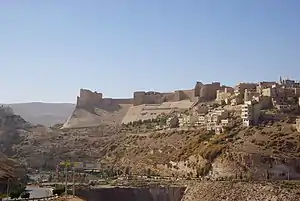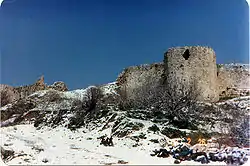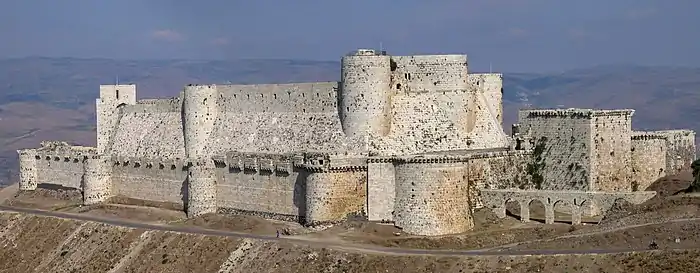
Krak des Chevaliers was built during the 12th and 13th centuries by the Knights Hospitaller with later additions by Mamluks. It is a World Heritage Site.[1]
This is a list of castles in the Eastern Mediterranean and Middle East, founded or occupied during the Crusades. For crusader castles in Poland and the Baltic states, see Ordensburg.
Crusader states
Geographic location on today's map
- Kingdom of Cyprus: Island of Cyprus (north and south)
- County of Edessa: south-east Turkey
- Principality of Antioch: north-west Syria, southern Turkey
- County of Tripoli: northern Lebanon, north-west Syria
- Kingdom of Jerusalem
- Lordship of Sidon: central Lebanon
- Principality of Galilee: northern Israel, southern Lebanon, southwest Syria
- County of Jaffa and Ascalon: southern Israel, eastern Egypt
- Lordship of Oultrejordain: south-west Jordan
Crusader castles by modern states
Cyprus

Kyrenia Castle
Egypt
Greece
- The Grandmasters Palace of the Knights Hospitaller of St. John on Rhodes
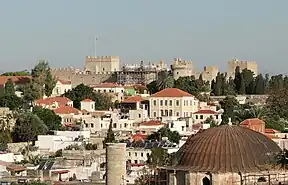 The Grandmasters Palace of the Knights on Rhodes island
The Grandmasters Palace of the Knights on Rhodes island - Platamon Castle
- Kastellorizo Castle
- Halki Castle
- Kos Castle
- Amfissa Castle
- Leros island castle
- Corfu castles
Israel
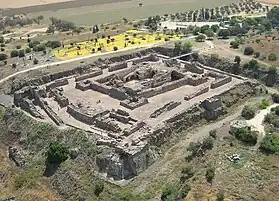
The remains of Belvoir Castle
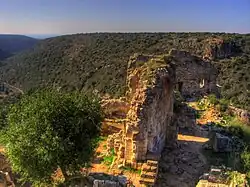
Monfort castle
- Acre (Akko) – fortified city
- Aqua Bella, now Ein Hemed – Crusader fortified farm; national park
- Arsuf, also known as Arsur or Apollonia – fortified city and citadel, stronghold of the Lordship of Arsuf; national park
- Ashkelon – fortified city
- Belinas – Banias; fortified town
- Belmont – ruins of Crusader castle in Kibbutz Tzova
- Belveer – Crusader castle of which no traces remain; national park
- Belvoir Castle; Kochav HaYarden National Park
- Bet Shean – castle ruins next to ancient town, stronghold of the Lordship of Bethsan. Second castle on the tell.
- Beth Gibelin at Eleutheropolis – castle ruins next to ancient town, stronghold of the Lordship of Beth Gibelin; national park
- Beit Itab
- Bethaatap, Arabic: Bayt 'Itab – fortified manor (maison forte)
- Blanchegarde at Tell es-Safi – castle, seat of a lordship at biblical tell
- Caco or Cacho Castle, Qaqun; rebuilt by Baybars; national park
- Caesarea (Maritima), stronghold of the Lordship of Caesarea – fortified port city; national park
- Cafarlet (Hebrew: HaBonim, Arabic: Kafr Lam) – ruins of Umayyad fort reused by the Crusaders
- Calansue, Hospitaller castle
- Casal Imbert – at Achziv (formerly Az-Zeeb until 1948) – Crusader "new town" with tower; nothing discernible at present
- Casel des Plains – Azor; ruins of Crusader tower; inside town
- Castellum Beleismum – tower on biblical Tel Dothan
- Castellum Beroart – the Minat al-Qal'a Umayyad fort reused by the Crusaders; at Ashdod
- Castellum Regis; castle, now inside village of Mi'ilya
- Caymont at Tel Yokneam, seat of lordship
- Chastel Hernaut or Arnoul, Latin: Castellum Arnaldi – castle at Yalu[2][3]
- Chastel Neuf or Castellum Novum outside Margaliot, castle, rebuilt in Ottoman time (Qal'at Hunin)
- Chastelet, castle ruin by Jacob's Ford: see Battle of Jacob's Ford; also known as Vadum Iacob, le Chastelez, Ateret, Qasr al-'Atra
- Castellum Rogerii Langobardi – castle at Umm Khalid/Netaniya[2]
- Château Pèlerin, also known as Atlit Castle and Castle Pilgrim; off-reach military base
- Citadel of Safed, fortress from the Second Temple/Roman period, major administrative center.
- Destroit, Le, near Atlit
- Forbelet Castle at Taibe, Galilee; battle site near the Hospitaller castle
- Givat Titora, castle ruins
- Ibelin, near Yavne
- Jaffa, fortified port town
- Judin Castle at Khirbat Jiddin or Yehiam Fortress – Crusader castle, rebuilt in the 18th century; national park
- Latrun, castle ruins
- Kastel, on a hilltop next to Mevasseret, by the main Jerusalem Tel Aviv road
- Merle - fortified enclosure, Arabic name: Burj al-Habis and Qal'at al-Tantura,[2] at Dor/Tantura
- Mirabel, in Hebrew: Migdal Tsedek, stronghold of the Lordship of Mirabel
- Montfort; inside national park
- Qula, Crusader tower and a vaulted structure
- Ramla, stronghold of the Lordship of Ramla
- Safed, large castle on the tallest hill, rebuilt by Baybars
- Saforie, le or Sepphoris (Latin), Saffuriya (Arabic): tower; national park
- Tel Hanaton – fortified farm
- Tiberias – fortified Crusader city immediately north of abandoned city established in Roman times; on the shore of the Sea of Galilee
- Toron des Chevaliers, at Latrun
- Tour Rouge or Turris Rubea at Burgata – Arabic: Burj al-Ahmar, Hebrew: Hurvat Burgata
- Tower of David – the citadel of Jerusalem
- Turris Salinarum at Tel Taninim – Crusader tower, the only remains of the castle
Jordan

Montreal (Shaubak)
- Ajloun Castle
- Kerak Castle[4]
- Montreal
- Tafilah[5]
- Vaux Moise (Wu'ayra in Arabic) near Petra[6]
Doubtful proposals
- Aqaba – doubtful, no traces found; castle on Ile de Graye might have been meant instead
- Diban Castle 31°30′7″N 35°46′36″E / 31.50194°N 35.77667°E
- Hisban Crusader Castle
Discarded proposals
- Jarash: the Temple of Artemis was reused as a castle by the Damascenes and destroyed by Baldwin II of Jerusalem, was therefore not used by the Crusaders.[7]
Lebanon
- Arqa
- Batroun
- Beaufort Castle
- Beirut Castle, demolished in the late 19th century
- Belhacem,[8] 33°34′24″N 35°28′36″E / 33.57333°N 35.47667°E
- Byblos Castle
- Citadel of Raymond de Saint-Gilles
- Doubiye Castle
- Gibelacar
- Coliath
- Deir Kifa Castle
- Hasbaya Castle
- Moinetre
- Mseilha Fort
- Nephin
- Saint Louis Castle – Sidon Land Castle
- Scandelion Castle
- Sidon Sea Castle, stronghold of the Lordship of Toron
- Toron, stronghold of the Lordship of Toron
Palestine
- Castrum Sancti Helie (Castle of St. Elias) - castle ruins at Taybeh
- Cisterna Rubea or Maldoim, Templar castle
Syria

The remains of Margat
- Areimeh Castle,[9] 34°44′40″N 36°02′33″E / 34.74444°N 36.04250°E
- Baniyas
- Bourzey castle
- Burj al-Sabi,[10] near Adimeh, 35°09′14″N 35°55′39″E / 35.15389°N 35.92750°E
- Chastel Blanc
- Chastel Rouge
- Krak des Chevaliers
- Maraclea
- Margat, also known as Marqab
- Masyaf Castle
- Montferrand
- Qadmous
- Rouad
- Saladdin Castle, Crusader name: Saône
- Sarmada
- Shughr-Bakas
- Citadel of Tartus and Cathedral of Our Lady of Tortosa
Discarded proposals
- Nimrod Fortress, Arabic names Qal'at Nimrud and Qal'at as-Subayba; Ayyubid castle expanded by Baibars, built to protect the road to Damascus from Crusaders and Muslim rivals; wrongly believed to be a Crusader castle.
- Qasr Bardawil, wrongly identified for a while as the Castle of al-Al
Turkey

The ruins of Bagras Castle, viewed from the southeast

The ruins of Amouda Castle
- Anavarza Castle
- Antioch
- Amouda
- Ayasuluk Castle, Selçuk
- Bagras
- Cursat,[11] 36°5′46″N 36°11′59″E / 36.09611°N 36.19972°E
- Geben
- Haruniye
- Kızkalesi
- Namrun Kalesi (Lampron)
- Rumkale
- Ravendel,[12] 36°52′22″N 37°3′10″E / 36.87278°N 37.05278°E
- Servantikar
- Silifke Castle
- Tece
- Tokmar Castle
- T‛il Hamtun
- Trapessac,[13] 36°31′53″N 36°21′52″E / 36.53139°N 36.36444°E
- Dumlu Kalesi,[14] 37°9′1″N 35°42′5″E / 37.15028°N 35.70139°E
- Yaka Castle
See also
References
Wikimedia Commons has media related to Crusader castles.
- ↑ Crac des Chevaliers and Qal'at Salah El-Din, UNESCO, retrieved 2010-11-08
- 1 2 3 Ellenblum, Ronnie (2007). Crusader Castles and Modern Histories. Cambridge University Press. p. 173. ISBN 9781139462556. Retrieved 7 June 2020.
- ↑ Pringle 1997, p. 107.
- ↑ Husseini, Rana (December 18, 2016). "Death toll in Karak attacks rises to 14, including four terrorists". Jordan Times. Retrieved 19 December 2016.
- ↑ Pringle 1997, p. 98.
- ↑ Pringle 1997, p. 105.
- ↑ Pringle 1997, p. 2.
- ↑ Belhacem
- ↑ "Qalaat Areimeh | Monuments of Syria أوابد سورية". monumentsofsyria.com.
- ↑ "Burj al-Sabi".
- ↑ "Castles.nl - Cursat Castle". www.castles.nl.
- ↑ Ravanda Castle
- ↑ Trapesac castle
- ↑ Tumlu
Bibliography
- Pringle, Denys (1997). Secular Buildings in the Crusader Kingdom of Jerusalem: An Archaeological Gazetteer. Cambridge University Press. ISBN 9780521460101.
This article is issued from Wikipedia. The text is licensed under Creative Commons - Attribution - Sharealike. Additional terms may apply for the media files.

